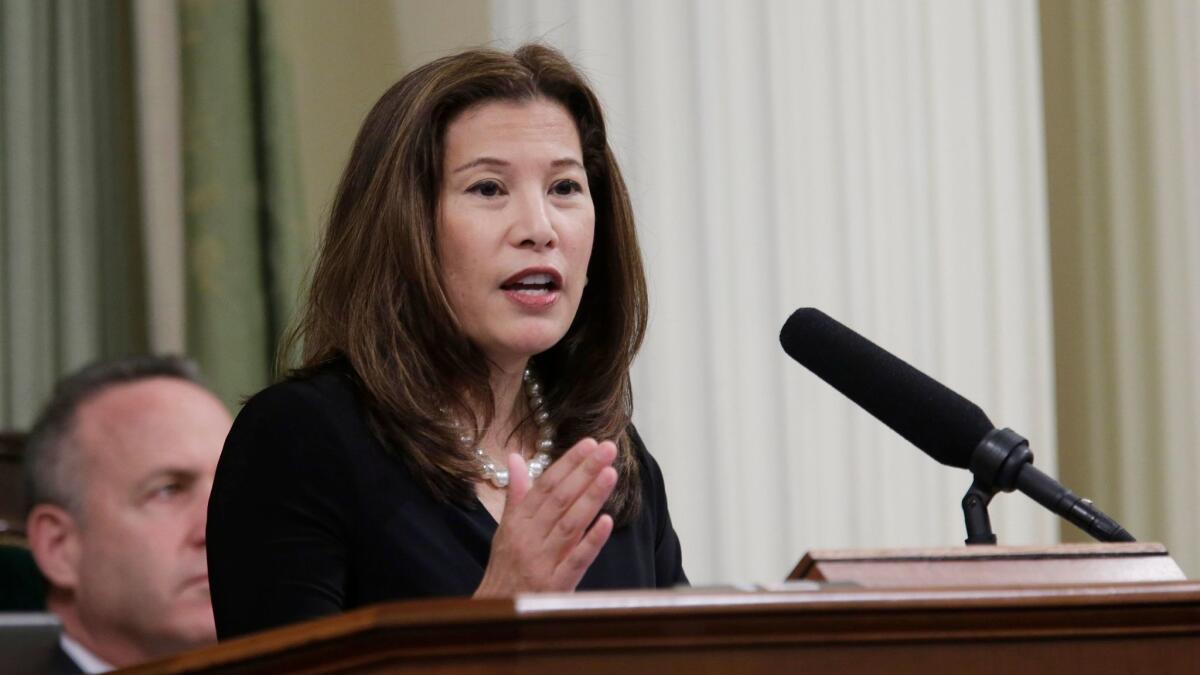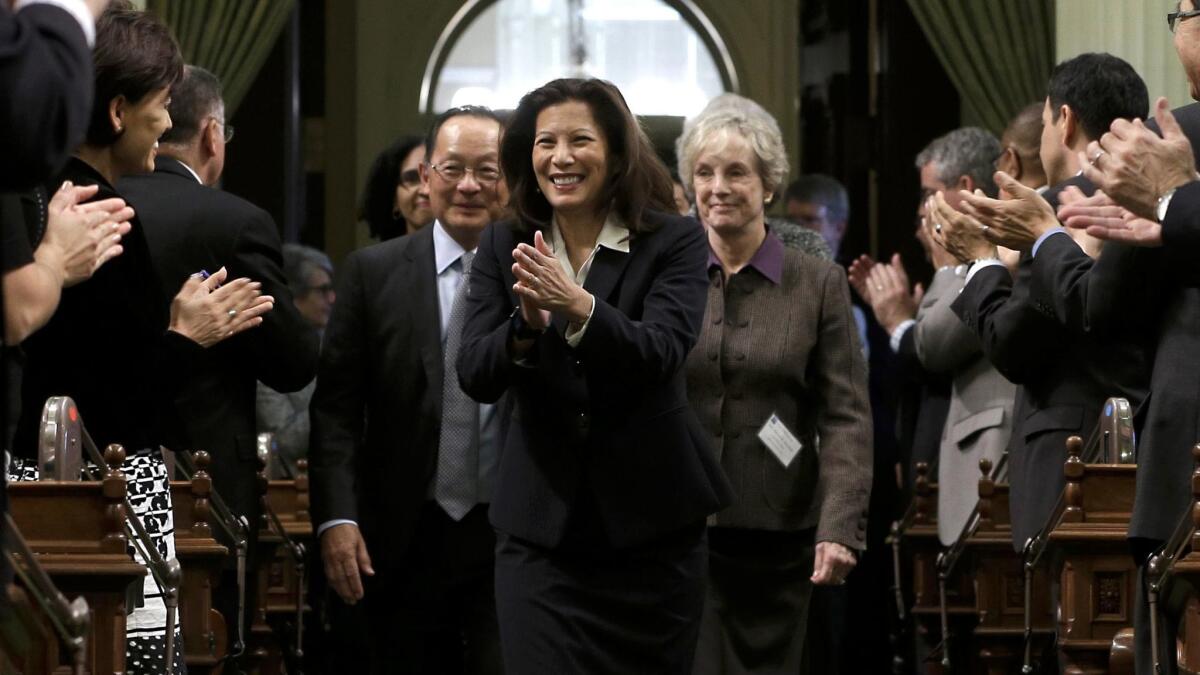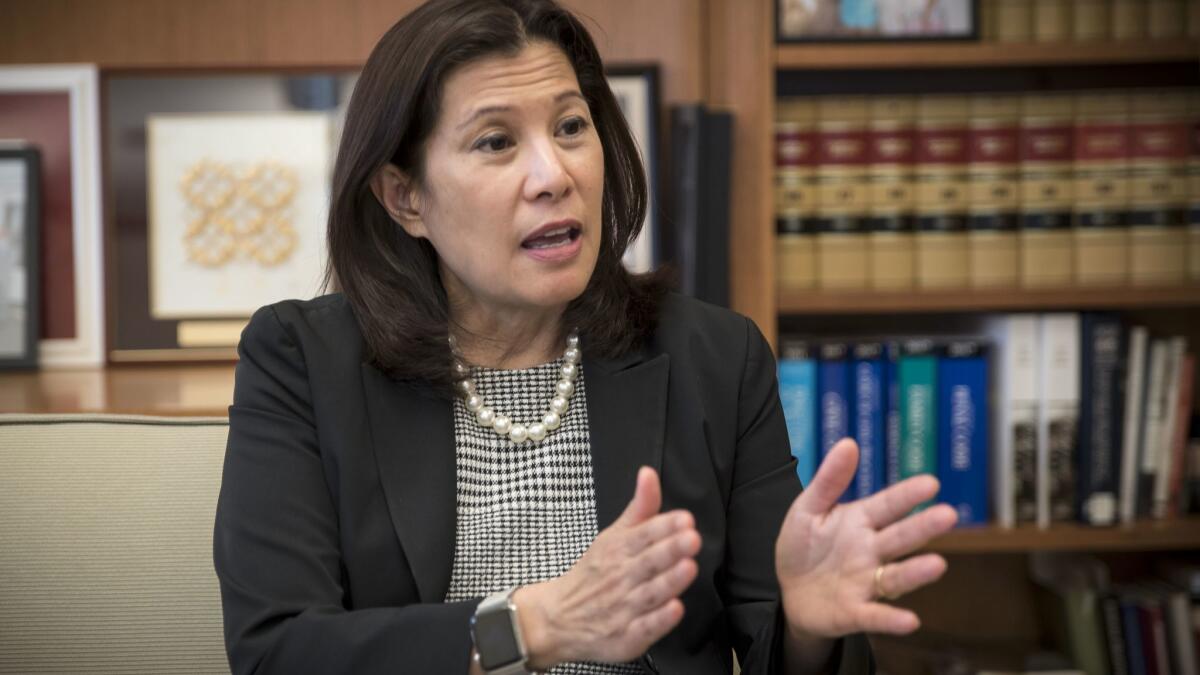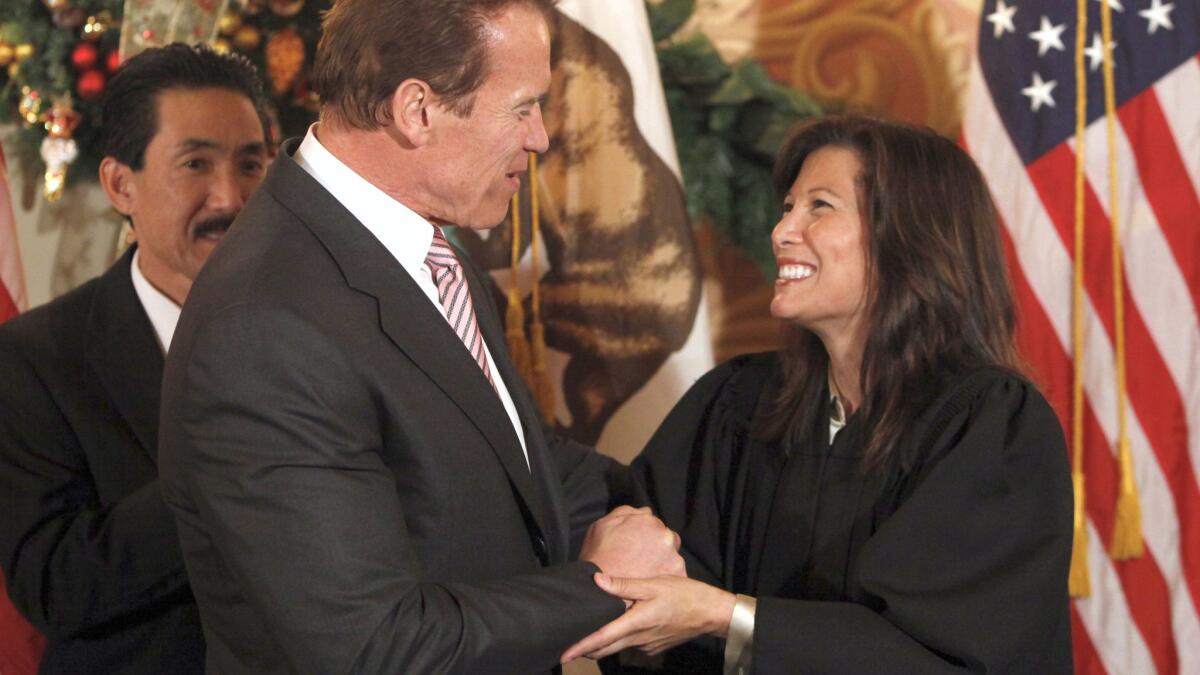They dismissed her as a lightweight. But California’s top judge has found her voice — and uses it to call out Trump policies

California Chief Justice Tani Cantil-Sakauye is calling on the Trump administration to keep its immigration agents away from state courthouses.
Reporting from San Francisco — Tani Cantil-Sakauye was an obscure judge on a Sacramento appeals court when then-Gov. Arnold Schwarzenegger selected her to become California’s 28th chief justice.
Rebel judges demeaned her as a lightweight whose first instinct when confronted with a problem was to create a task force. Her lobbying failed to stop state funding cuts that hobbled the courts. Some legislators appeared dismissive. A male assemblyman described her as “attractive” but said he didn’t agree with her.
Seven years later, Cantil-Sakauye is not so easily dismissed.
Settled in as California’s top judge, she is speaking her mind, calling on the Trump administration to keep its immigration agents away from state courthouses and giving a highly publicized address that reflected California’s jitters about the new president.
Motivated to speak out by WWII internment of Japanese Americans
During an interview in her chambers at the court’s headquarters in San Francisco, Cantil-Sakauye said she decided to confront immigration policy after reflecting on the 75th anniversary of the internment of Japanese Americans.
“There were voices that spoke out against internment but not enough,” she said.
Her husband’s parents were among the more than 120,000 Japanese Americans removed from their homes and sent to live in camps for four years without their possessions.
At the same time she was absorbing her in-laws’ “shocking” stories, she was hearing constant reports of anxious immigrants showing up in California courthouses — starting in January, when President Trump took office — with worries.

I am kind of getting the hang of it, and there is plenty to do. This is such a great job.
— Chief Justice of California Tani Cantil-Sakauye, who has five years left in her term
They wanted to know: How can I protect my kids if I am deported? If I obtain a restraining order against a violent boyfriend, will immigration authorities be tipped off to my existence? My children were born in this country — can they stay if I am deported?
Though immigration is the purview of federal courts, Cantil-Sakauye said it was “fundamentally unfair” that some people lacked access to information.
The result was an online immigration resources directory on the state court website.
More disturbing reports flowed into her chambers.
Judges told her that immigration agents were going into courthouses, intimidating immigrants there to testify or deal with other legal matters. A reception room in a dependency court in Southern California cleared out after someone said there was an agent in the building. Some immigrants stopped sending their children to school.
“This was ongoing,” she said of the reports.
Cantil-Sakauye, mindful of a need to be impartial, did not want to appear to be critical of the law. She is a former prosecutor who put people in prison, and her husband is a retired police lieutenant. She owes her appointments to a series of Republican governors.
“I decided to write a letter,” she said.

Her aim, she said, was to get the federal government to add courts to a list of “sensitive sites” that agents should avoid. She didn’t want immigrants to be afraid to come to court.
In a letter to U.S. Atty. Gen. Jeff Sessions and Homeland Security Secretary John F. Kelly, she asked that immigration agents stop “stalking” immigrants here illegally at California’s courthouses.
“Courthouses should not be used as bait in the necessary enforcement of our country’s immigration laws,” she wrote.
The chief justices of Oregon, Washington and New Jersey later endorsed her stance.
She continued to speak out in a television interview a few days after writing the letter. She called Trump’s criticism of federal judges “very threatening to the third branch of government.”
Her views received national coverage, and Sessions and Kelly fired back. They admonished her in a letter for using the word “stalking” and told her to take her concerns to Gov. Jerry Brown.
“I think they intended to scold me,” she said, “but I have been in law for more than 30 years, and I am used to being scolded.”
The Washington Post declared that Cantil-Sakauye was “fast emerging as one of the Trump administration’s most vocal critics in the judiciary” — a description she said made her “uncomfortable.”
She received an ugly message on her voicemail and threatening emails, which she reported to the California Highway Patrol, the agency in charge of her protection.
Still, she continued to speak out.
In her annual state of the judiciary address to the Legislature in March, she warned that the rule of law was being threatened and should not be taken for granted. Though she never uttered the name Trump, most observers thought it was about him.
“The rule of law means that we as a people are governed by laws and rules, not by a monarch,” she said.
She no longer hears of immigration agents lurking in courthouses, she said, “but I just don’t know if they are simply regrouping and replanning.”
I think they intended to scold me, but I have been in law for more than 30 years, and I am used to being scolded.
— Cantil-Sakauye on the response from Atty. Gen. Jeff Sessions and Homeland Security Secretary John F. Kelly to her letter
She is now one of the veterans on the state high court, and at 57, no longer the youngest justice.
Her tenure has seen high turnover, with the older Republican appointees retiring and being replaced by more liberal Brown picks. By the end of the year, Brown will have chosen a majority of the court’s judges.
Legal analysts consider Cantil-Sakauye a centrist on civil matters but one of the more conservative justices on criminal law, an area in which she is considered deferential to decisions by trial judges.
Some expect she will slowly move to the left, influenced by the new liberals on the court and the apparent shift of the California electorate away from harsh, punitive laws. Former Chief Justice Ronald M. George became more liberal over time.
The Cantil-Sakauye court has yet to decide a blockbuster case, such as same-sex marriage or the lesser-known but also contentious gay rights cases that came before it. The justices have sided with environmentalists, open-government advocates and workers in some cases, deferred to the Legislature and the governor in others and upheld most, but not all, death penalty cases.
Cantil-Sakauye said Brown’s justices have changed the court. During private deliberations, the discussion is “more robust” and “far more convivial,” with judges weighing in about case after case with “a fair amount of it teasing and joking,” Cantil-Sakauye said.

She described the Brown appointees as “incredibly bright people who ask a lot of questions and are careful thinkers.” Still, none had been a judge, and she said she hopes Brown will name a person with state judicial experience to replace Justice Kathryn Mickle Werdegar, who will retire this summer.
The chief justice has proved to be a gifted public speaker — she doesn’t use notes — and she is much in demand. When she gives her annual address to the Legislature, people often line up to be photographed with her.
Santa Clara University law professor emeritus Gerald Uelmen called her “very productive,” both on the court and off.
“She cranks out more than her share of opinions, and many of them are unanimous,” he said. “She is out speaking every week.”
Some judges complain about how she runs the court system.
She receives high marks from her colleagues on the high court and from lower court judges who have worked with her on the Judicial Council, the policymaking body for the courts, which she heads.
A group called the Alliance of California Judges has been critical of her, but Sacramento County Superior Court Judge Maryanne Gilliard, a director of the alliance, said the board did not want to comment on her.
The group, which mostly includes Superior Court judges, was formed in 2009 as a reaction to centralization of the courts under the Judicial Council. The alliance has complained that Cantil-Sakauye does not tolerate dissonant voices in court governance or give trial courts enough autonomy.
In the past, the chief justice has made polite statements in response to Brown’s budget cuts for the judicial branch, thanking him when money was restored and refusing to lambaste him for the courts’ woes. She said she didn’t want to “bite the hand.”
But earlier this month, she was quick to criticize Brown’s newly revised state budget.
The spending proposal would give trial courts a little more than a penny for every general fund tax dollar, she said, less than what the courts received before the Great Recession.
“This is neither fair nor just,” she asserted, and promised to fight for more.
A blackjack dealer who could spot the bluffers
Cantil-Sakauye was an unconventional choice for chief justice.
Unlike her predecessors, she did not come from elite schools. Her parents had been farm workers. She was the first non-white and only the second woman to head California’s gigantic court system.
She grew up in Sacramento in a warm, close Filipino family and began working outside the home at age 13, babysitting, working at a sandwich shop and eventually waitressing.
When she was 9, her family learned that the city considered their home “blight” and intended to tear it down for a luxury condominium project. Her mother went to court to fight the condemnation. She could not afford a lawyer, and she lost.
Cantil-Sakauye studied law at UC Davis, where she also received her undergraduate degree, and worked to pay her way. After her first year of law school, she worked in Lake Tahoe dealing blackjack, a job she held off and on over the years.
She said that dealing cards helped her later in picking juries. She could spot the bluffers and dissemblers.

She was 50 when Schwarzenegger chose her to lead the state high court, partly on the recommendation of George, who said he believed she would be a strong administrator. She wore her dark, wavy hair long back then, and her looks attracted attention.
Some aides complained that legislators initially failed to take her seriously.
State Sen. Hannah-Beth Jackson (D-Santa Barbara) said Cantil-Sakauye’s diminutive size and beauty may have contributed to an “unconscious bias.”
“She is an attractive woman, no two ways about that, and that could have added to the challenges,” Jackson said.
Retired Judge Steven Jahr, a former top administrator for the court system during Cantil-Sakauye’s early years, said she “never took the bait” if someone treated her disrespectfully. Instead, “she would turn toward them and reason with them.”
But she also showed a “steely quality,” he said. She could convey that her position was unalterable, without raising her voice, he said.
“It was rare, but when she did it, no one missed the signal,” he said.
In taking the reins of the state Supreme Court, Cantil-Sakauye presided over veteran judges who for years had outranked her.
During her first year on the court, her new colleagues voted to review one of her rulings in a relatively high-profile case. She recused herself, and the court unanimously overturned the decision she had written on the court of appeal.
She called the episode “humbling.”
With five years left in her term, Cantil-Sakauye has yet to decide what might come next.
She said she might just pursue another 12-year term — justices appear on the ballot unopposed for retention.
“I am kind of getting the hang of it, and there is plenty to do,” she said. “This is such a great job.”
Twitter: @mauradolan
ALSO
What’s at stake as Trump gets to ‘see you in court’ over the travel ban
More to Read
Sign up for Essential California
The most important California stories and recommendations in your inbox every morning.
You may occasionally receive promotional content from the Los Angeles Times.











